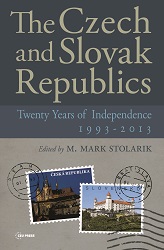The Czech and Slovak Republics. Twenty Years of Independence, 1993-2013
The Czech and Slovak Republics. Twenty Years of Independence, 1993-2013
Contributor(s): M. Mark Stolarik (Editor)
Subject(s): History, Social Sciences, Sociology, Recent History (1900 till today), Special Historiographies:, Economic development, Transformation Period (1990 - 2010), Post-Communist Transformation
Published by: Central European University Press
Keywords: Politics and government;Czech republic;Slovakia;Post-communism;Social conditions;Economic conditions;
Summary/Abstract: The essays in the book compare the Czech Republic and Slovakia since the breakup of Czechoslovakia in 1993. The papers deal with the causes of the divorce and discuss the political, economic and social developments in the new countries. This is the only English-language volume that presents the synoptic findings of leading Czech, Slovak, and North American scholars in the field.The authors include two former Prime Ministers of the Czech Republic and Slovakia, eight leading scholars (four Czechs and four Slovaks), and eight knowledgeable commentators from North America. The most significant new insight is that in spite of predictions by various pundits in the Western World that Czechia would flourish after the breakup and Slovakia would languish, the opposite has happened. While the Czech Republic did well in its early years, it is now languishing while Slovakia, which had a rough start, is now doing very well. Anyone interested in the history of the Czech and Slovak Republics over the last twenty years will find gratification in reading this book.
- E-ISBN-13: 978-963-386-154-7
- Print-ISBN-13: 978-963-386-153-0
- Page Count: 378
- Publication Year: 2016
- Language: English

